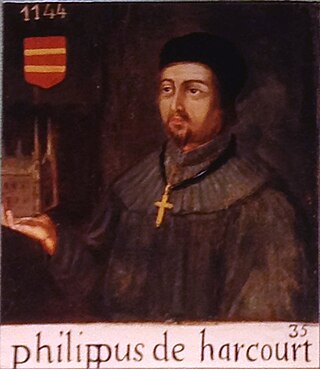Related Research Articles

Walter de Merton was Lord Chancellor of England, Archdeacon of Bath, founder of Merton College, Oxford, and Bishop of Rochester. For the first two years of the reign of Edward I he was – in all but name – Regent of England during the King's absence abroad. He died in 1277 after falling from his horse, and is buried in Rochester Cathedral.

Philip de Harcourt was a medieval Lord Chancellor of England and Bishop of Bayeux. He was unsuccessfully elected as the Bishop of Salisbury.

Godfrey Giffard was Chancellor of the Exchequer of England, Lord Chancellor of England and Bishop of Worcester.
John Chishull or John de Chishull was Lord Chancellor of England, Bishop of London, and Lord High Treasurer during the 13th century. He also served as Dean of St Paul's.
Walter Giffard was Lord Chancellor of England and Archbishop of York.

Walter de Cantilupe was a medieval Bishop of Worcester.
Herbert Poore or Poor (died 1217) was a medieval English clergyman who held the post of Bishop of Salisbury during the reigns of Richard I and John.

The Bishop of Worcester is the head of the Church of England Diocese of Worcester in the Province of Canterbury, England.
Thomas Cobham was an English churchman, who was Archbishop-elect of Canterbury in 1313 and later Bishop of Worcester from 1317 to 1327.
Simon Walton was an English clergyman who served as the Bishop of Norwich.
Henry Sandford was a medieval Bishop of Rochester.
Henry Brandeston was a medieval Bishop of Salisbury.
Nicholas Longespee was a medieval Bishop of Salisbury.
John Gervais was a medieval Bishop of Winchester.
Richard de la More was a medieval clergyman who was Bishop-elect of Winchester from 1280 to 1282. He was also an MP for Gloucestershire from 1290 to 1295.
Simon was a medieval Bishop of Worcester.
William of Northall was a mediaeval Bishop of Worcester.
John of Coutances was a medieval Bishop of Worcester.
Sylvester was a medieval Bishop of Worcester.
William de Blois was a medieval Bishop of Worcester.
References
- British History Online Archdeacons of Ely accessed on 2 November 2007
- British History Online Bishops of Winchester accessed on 2 November 2007
- British History Online Bishops of Worcester accessed on 2 November 2007
- Fryde, E. B.; Greenway, D. E.; Porter, S.; Roy, I. (1996). Handbook of British Chronology (Third revised ed.). Cambridge: Cambridge University Press. ISBN 0-521-56350-X.

